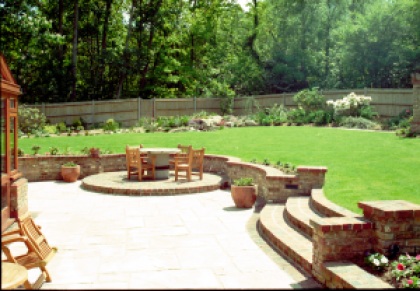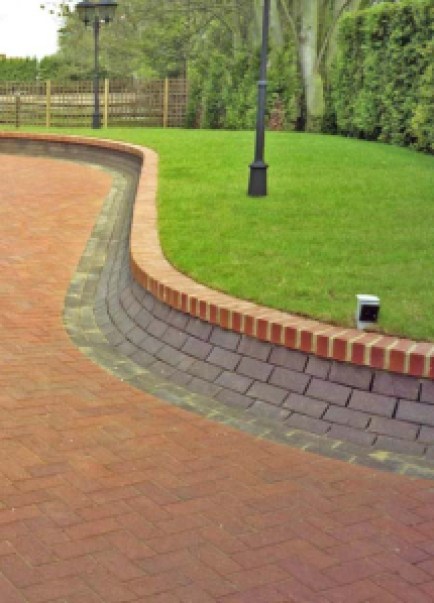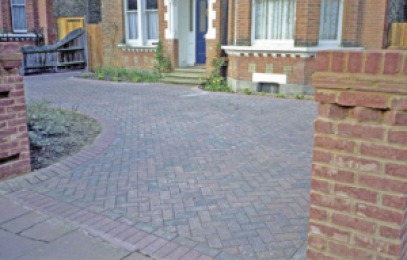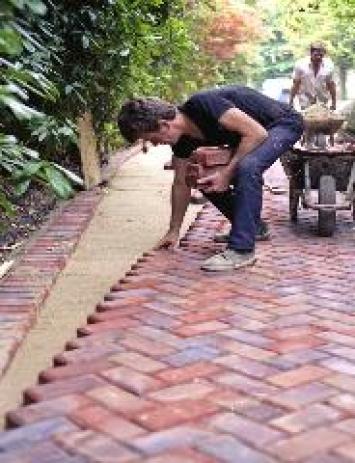Landscaping Ideas
-
What one item or feature is the most important in a garden landscape today ?
So a question ?
What one item or feature would you add to your or your clients garden today?
When we started out with our then new company back in 1984, we identified “designer drives”, especially drives with an ‘In & Out’ drives as the most important. Sure enough within 6 months our order book stretched out into the following year.
The first drive we built in the then traditional way, hardcore sub base, with natural frost proof bricks laid on wet mortar and then pointed with a stiff one to three pointing mix – it took ten days!

Then we remembered a new dry-lay product we had used when we worked in the parks department, it had been designed for bus stops. Called ‘monolok’ it was a ‘z’ shaped concrete block.
We called Marshalls the manufacturer who dispatched a sales rep with a new rectangular version, available in grey and off red only … we loved the product but were not over enthusiastic about the colors.

Other firms descended on us for information, our advertising, which showed sporty cars sitting on interlocking concrete block and brick paving, produced lots of interest.
It wasn’t long before the manufacturers were calling wanting to take pictures of our drives. Which they used in their advertising material.
An example of a brick drive
Here we used stock brick paving. Although fairly soft, with somewhat irregular shapes, requiring much shorter modules, it keeps its color very well.

45 degree herringbone 
Here a much harder engineering quality natural brick is used to good effect. Although to be honest it looks a little ‘hard’

Dri-lay natural brick drive The next was concrete block paving, these were very hard, initially with limited colors. The color does fade quite quickly. They are also quite slippery in the ice.
Some of my favorite materials to use.
As our order book enlarged we started offering more expensive solutions, such as granite setts – something the Romans introduced.

This granite sett pathway is extremely hard wearing and yet very rustic looking. These drives are very hard wearing, color fast, strong, again a little slippery in ice.

It wasn’t long before we included ‘Fish scale’ versions, these took quite a long time to set out, but looked absolutely amazing when completed.

Laying small unit sett paving of almost random size in a radiating pattern requires skill and patience…. Then these circular natural sett patterns became popular. The radial patterns create a strong a sense of movement – just look at them long enough, they seem to ‘move’
What new trend, item or feature do you think will be the favorite for 2020?
We will interview the top three on our radio show Growingtrends.org during the year.
Just drop us a line with your suggestions..
Views: 313
-
Dri-lay Drives
Dry – Lay Drives

We developed ‘Designer Drives’ almost 30 years ago..
How it all started..
My partners and I had worked for a London Parks Department. On some of the projects we were working on, we needed to use a strong paving material. At the time Marshalls( one of our suppliers) were testing a product called ‘Monolok’. It had been developed in Europe for use at bus stops. To prevent the heavy buses sinking into the tarmac, on hot days. These ‘monolok’ blocks were of differing sizes and worse ‘z’ shaped. This made them a nightmare to design with.
They were though, a really clever idea. They interlocked together, without using mortar, this effectively meant they stayed in position, didn’t crack or sink, but could be ‘unzipped’ and then relayed – if say a pipe needed working on below.
One day our sales contact rushed in with some new ‘brick-shaped’ grey blocks. He told us red would also be available soon. Did we want to try them? We immediately saw an opportunity. Using traditional bricks with a mortar bed required a heavy-duty brick version, worse it took days to point … see below.
This particular in and out brick driveway took 10 man-days just to point the bricks. Whereas the drive below took 4 hours to ‘sand in’ with kiln-dried silica sand.
Saving so much time, significantly increasing our profits on each project. We were soon demanding new, more interesting colours.. here’s one using a brindle colour mix..
New methods.
It didn’t take us long to refine our own techniques. Adding our own recessed manhole covers. Canting the edges so homeowners knew where they were as they drove around their driveway. – The slightly raised edge looked great visually as well. Setting us apart from our competition.
Here a well constructed and cut in recessed cover… this time using a softer stock brick.
When well done it’s very hard to see the recessed cover, as in this picture.. there are two in the lower picture!
New layout pattern
We soon added a ‘fish- scale’ pattern using granite setts. Then a phorphery sett to our ‘Designer’ collection..
Here’s some granite…much more expensive but they look superb !
When using ‘natural’ products. Such as the granite and real bricks it is important to remember that they are often differing sizes. This means that it is very easy to lose the design module. If you have too big an area its important to have adequate changes in direction.
The stock bricks below work for about a length of 1.8m ( 6ft). Then you need to add a break line or the pattern will start to wander off.
Below is a combination of natural granite setts and softer stock bricks – my favorite by far!

Would you like to read more Landscape projects ? – More Award winning projects
We would love to hear your thoughts and comments
Views: 842
-
Green Roof
Green Roofs
We soon discovered that the modular layout of the green walls worked superbly for Green roofs.
So in 1994 we designed and built this award winning Green Roof in central London.

Wooden pathway on Roof Garden Views: 327
-
A natural stone patio and entertaining area
Patios & Terraces

A Brick and Stone Terrace
A lovely natural stone and brick patio, surrounding a conservatory.
Today, I thought it would be fun to show you a series of before, during and after pictures of a patio/terrace construction.
Mick and Steve who constructed this lovely terrace. Are extremely skilled craftsmen.
If you look carefully at the stone cutting you will see how ‘evenly spaced’ all the joints are .
Base Foundation.
It all starts with good preparation on a stable foundation. In this case around 100mm ( 4 inch) of graded limestone base well consolidated.
If the ground is moist or subject to shrinkage it’s a good idea to add a geo – fabric beneath the limestone.
Surface.
You should make sure the finished height of the paving, is at least 150mm ( 6 inches) below the damp proof course set in the house brick walls.
It is also a very good idea to create a fall away from the house to your drains, ( at least a 1 in 80 fall is required).
Also, consider the need for allowing moisture around the house.
If you are on heavy clay, it is a good practice to allow the clay sub surface to remain a little damp during the summer to prevent the ground ‘heaving’.

First the walls and steps are constructed. 
Note how clean the working area is. 
Here Mick is carefully, pointing the natural stone, using a semi dry mixture of soft sand/sharp sand/ cement. Make sure the conditions are dry. Then firmly point between the paving joints. 
Raised brick seating area 
The completed terrace, with low walls to enable larger groupings , for entertaining. The gently curved wall naturally leads the eye around the establishing garden Views: 150
-
Design and Build
English Landscape LLC is my Landscape Design & Build company.
Here you will find a wealth of ideas, with lots of picture examples of finished projects. Before and after picture examples , all from almost 45 years of high quality, award winning work.


Sometimes a landscape just seems to ‘pop’ right out at you, you become almost spellbound by its balance and harmony.
This doesn’t happen by chance very often. It is a result of a client choosing the right designer and then working together as a team to create a dream.
A living stage if you will , that constantly changes with the seasons, and yet develops into this amazing restful, visual smorgasbord of colour, contrast and functionality.
Today I thought it might be fun to show some projects under construction, you will notice that most are orderly, very little mess to clutter the picture
( the cleaner you can keep a site the more efficient and the higher the final quality often is).
I hope you enjoy, take a look at some projects here. English Landscape LLC
Chris
Views: 2
-
Environmentally friendly structural walls
Environmentally friendly structural Timber Retaining Walls
Timber structural environmentally friendly walls were designed over 40 years ago.
They were originally designed to last for around 50 years . We have been designing and building them since 1984.

Recently we were asked to carry out some minor repairs to a wall that had been built approximately 23 years ago, on Long Island

Amazingly well preserved !
Once we had exposed the back face of the wall, it was clear that the timber was almost in the same condition as when the wall had been constructed. You can see here a few examples.
If you are looking for an environmentally friendly, long lasting in expensive wall you may want to take a longer look, if you would like to make the wall truly green, i.e. a planted wall then TimberGrid is maybe for you.
Check out some more information here Walls.
Want to know more just send me an email… chris@chriscoope.com
Views: 240



















